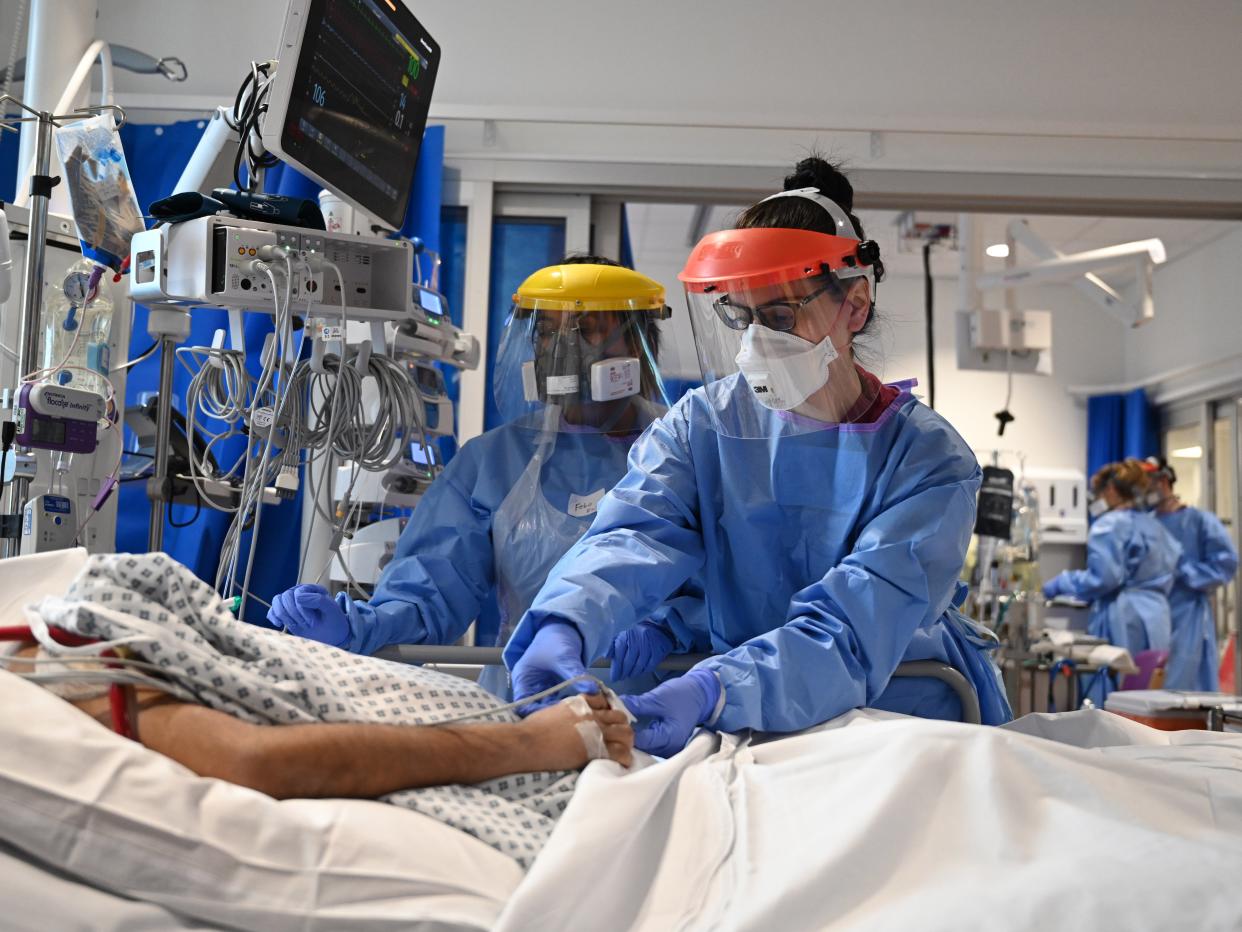Coronavirus: NHS leak shows London hospitals starting to feel second wave pressure

The number of coronavirus patients admitted to London hospitals jumped by almost 10 per cent earlier this week as the capital begins to feel the pressure from the second wave.
Leaked NHS assessments of the situation for London show some of London’s hospitals have already got more than 10 per cent of their beds occupied with coronavirus patients.
Earlier this week the numbers being admitted jumped eight per cent in a single 24 hour period sparking fears among NHS managers that London could start to see rapid increases in the coming days.
An Imperial College London study has also warned the the R rate of transmission for the virus in London is 2.86, the highest level in England. This could mean the number of infected people may be doubling every three to four days.
While London was at the epicentre for the first wave of the virus in March and April the second wave has been concentrated in the north of England but a succession of studies show the infection rate growing in southern parts of the country.
According to the leaked data seen by The Independent across London on Tuesday there were 791 coronavirus patients admitted to hospital in London.
Barking, Havering and Redbridge University Hospitals Trust had the most, with 142 covid-19 patients, 16 per cent of the hospitals total beds. It had 12 patients in critical care on ventilators and another 124 on oxygen.
North Middlesex University Hospitals Trust had 12 per cent of its beds occupied by patients with coronavirus, a total of 50 on Tuesday although the number is thought to have increased since then.
Epsom and St Helier University Hospitals Trust in south London 61 Covid patients, 10 per cent of its beds.
Across London as a whole, around six per cent of beds are occupied by Covid patients.
While this is far below the peak seen earlier this year, the leaked NHS report said the “headroom†for hospital beds had fallen sharply in a matter of days from 1,000 to 645.
It added: “London saw a 7.9 per cent increase in total Covid-19 patients to 791 yesterday (Tuesday).â€
It warned of a “steady increase†in staff absence, patients on ventilators and demand in A&E departments.
The slow rise in pressure has not yet led to any trusts activating their Coronavirus plans but the impact of the second wave is seen as inevitable among some NHS staff.
One intensive care consultant in the capital said: “I worry it will be harder than last time for those staff who are needed to redeploy to the Covid areas. Last time everyone tried their best to muck in and help out, even outside their skillset, and learned so much as well as being useful.
“However, returning to usual specialities and areas over the summer has shown staff very clearly what care and treatments their regular patients missed out on. People are scared of that happening again, with the wider healthcare consequences of delayed treatments for patients and a loss of speciality training opportunities for healthcare workers.â€
Another senior doctor told The Independent: “No one is looking forward to it, but we are ready. We’ve done it before, and learned a great deal from the last surge. What will be difficult is keeping the routine services running.
“There is already an enormous backlog of patients whose conditions are steadily becoming more serious while waiting for treatment. Staff shortages through isolation requirements are also causing a strain on the system. We will bend over backwards for our patients, but this winter is going to be really difficult for everyone."
Widespread concerns have been raised about NHS staff being exhausted and at risk of burnout with some hospitals seeing large numbers of staff reporting mental health issues.
One doctor who was re-deployed to look after Covid-19 patients in the first wave in London warned staff may struggle to cope during a second peak.
They said: “I went into the first wave already exhausted just from trying to do our normal job in an ever-pressured and resource-tight NHS
“Looking down the barrel of the second surge, I am so much more exhausted than I was in March, and wherever I drew the reserves from the first time around, I just don’t think they’re there any more and I don’t think I’m the only one.
“I think we’re going to see people coping and coping and coping ... right up to the point that they don’t.â€
Gary Marlowe, chair of the British Medical Association’s London regional council said: “Having the estimated highest R rate in the country, meaning that each infected person in London is infecting up to three more, is potentially catastrophic for our capital city. Local health services are already buckling under the pressure and in some areas of London we are now seeing a steep rise in the number of patients needing intensive care.
“And while death rates are currently low, we know the number of people who will lose their lives is likely to rise.â€
He added: “People cannot live in a never-ending Tier 3; they need to know when an end is in sight and what to do to keep infection rates low. If such a strategy is not put in place by government, the cycle will keep repeating itself and the consequences will be grave.â€
NHS England was approached for comment.
Read more
Fears grow over burnout among NHS staff as second wave intensifies
Coronavirus: 10,000 UK patients now in hospital with Covid-19
NHS to target risk of Covid outbreaks after watchdog investigation


